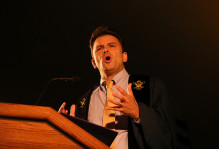Advancing Democratic Engagement
William & Mary’s history gives us a unique perspective on the importance and meaning of civic engagement and public service in a democracy. Often referred to as the “Alma Mater of the Nation,” William & Mary is in position to be a model for public service and civic leadership. In recent years the university has garnered accolade for our alumni dedication to public service. In November 2013, a report released by the Aspen Institute and published in Washington Monthly, concluded, William & Mary had more graduates enter service careers over the first decade of the new millennium than any other national university. William & Mary topped the national university listing with 32.1 percent of its graduates reporting government and non-profit sector positions for their first and second jobs. Each year proportionately more William & Mary graduates serve in the Peace Corps than any other college or university and Teach for America is annually the largest employer of William & Mary graduates.
Drawing on this rich legacy, we have the opportunity to build an epicenter that is unique in the United States with a center in our nation’s capital and one on main campus. What if William & Mary were to aspire to become the premier higher education institution for educating, convening and researching civic leadership?
With focus on educating, convening and researching for an increase in civic knowledge, civic skills, civic values, where education is defined as developing in students:
- Civic Knowledge: students recognize social problems exist in communities; think critically about social problems
- Civic Skills: students engage in and communicate effectively with diverse populations
- Civic Values: students understand of one’s own values; expectation to work toward a common good beyond college.
Trust in one another and in key institutions — the media, government, and the courts — are at historic lows. The percentage of Americans who say others can be trusted fell from 46 percent in 1972 to just 31 percent in 2016, with 36 percent of whites and 17 percent of blacks expressing such trust. In turn, the number of hate groups has more than doubled since 1999. It is no surprise that communities are divided in places like Charlottesville, Ferguson and Chicago. As America becomes more diverse, we need bridges across racial and socioeconomic lines to build inclusive communities with more opportunities for all. Alas, that’s pretty darn tough in our systematic racialized history and social norms.
Every day I witness students considering their role on campus. Exploring identity. Examining privilege. Every day they challenge the system they earned membership in just months or a few years prior. Not a bad thing for democracy.
Colleges and universities should linger in the hard work of community development, where engagement means, over the long term graduating students who, by their example, help to fix the system that created our national conundrum. Our nation is in desperate need of effective, deliberate economic and political discussions that produce shared understandings. Colleges should have the guts and the freedom to teach for this very democratic value. So if you ever wonder why we’re reading such seemingly disconnected articles and lingering in discussion, we are doing it to advance democratic engagement. The role W&M plays in shaping the USA is not inconsequential. In fact, I would assert, people are looking to us among others, for leadership to drag us out of this quagmire.


No comments.
Comments are currently closed. Comments are closed on all posts older than one year, and for those in our archive.